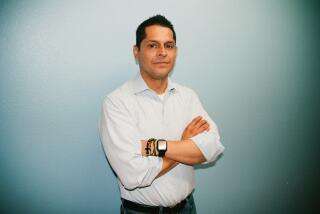Walter Moore: L.A. mayoral candidate
With the March 3 primary election drawing near, The Times asked all candidates for Los Angeles mayor to respond to questions about key issues facing the nation’s second-largest city. Here are the responses from candidate Walter Moore:
1. What distinguishes you from the other candidates in the race?
My credentials, experience and platform distinguish me from the other candidates.
I graduated with honors from Princeton University with a degree in public and international affairs. That’s important because it means I have the specialized training needed to analyze the costs and benefits of policy proposals. Indeed, I worked my way through college by doing just that. My training includes a year of microeconomics, a year of macroeconomics, plus courses in econometrics, public finance, Soviet-type economies and international trade. If [Mayor Antonio] Villaraigosa has any training whatsoever in economics, he has certainly kept it a good secret.
I graduated with honors from Georgetown Law, where I was an editor of the Georgetown Law Journal. During my third year, moreover, the law school hired me to teach legal research and writing and oral advocacy to first-year students. Villaraigosa, by contrast, attended the unaccredited People’s College of Law. I passed the California Bar Exam on the first try. Villaraigosa, by contrast, never passed the bar, despite trying four times.
I have been a business trial lawyer for nearly 25 years and am a licensed real estate broker. That’s important, because it means I know how to fight to protect taxpayers’ rights from crooked politicians and frivolous lawsuits.
My platform, moreover, sets forth specific proposals to make Los Angeles great again. Examples include: Jamiel’s Law, which I wrote; a proposal for bus rapid transit to speed traffic throughout the city, rather than our having to wait 20 years for a “Subway to the Sea” that would traverse just nine miles along Wilshire; an end to “welfare for the rich” and other boondoggles; and much more. You can read all about it at my website, WalterMooreForMayor.com.
2. Los Angeles likely will face a deficit of $400 million to $500 million in the 2009-2010 fiscal year, as well as steep shortfalls in the years that follow. If elected, how would you balance the city budget? Specifically, what programs or services would you cut, what taxes or fees would you increase and what other measures would you take?
The city’s revenues are at an all-time high: $7 billion per year, up 32% from when Villaraigosa took office. The only reason we have a deficit is that he has insisted on overspending, despite repeated written warnings from the city administrative officer dating back to October 2005.
We can eliminate the deficit in a heartbeat by eliminating Villaraigosa’s “welfare for the rich” and absurd boondoggles, including, for example the following: (a) $95 million in subsidies and tax breaks Villaraigosa has given to a company owned largely by the royal family of Dubai; (b) over $500 million per year that Villaraigosa takes from taxpayers and gives to millionaire and billionaire developers through the Community Redevelopment Agency; (c) $168 million per year of our money that Villaraigosa hands to sketchy, unregulated “anti-gang” programs run by “ex” gang members who have an embarrassing tendency to get caught committing crimes while supposedly working for these programs; and (d) idiotic expenditures like $18,000 to teach civil servants “sphincter control.”
3. To cut costs, Mayor Antonio Villaraigosa is considering layoffs or offering early retirement to city employees. Do you support either or both of those alternatives? Given the increased need for government assistance in these bad economic times, is now the right time to reduce the number of city employees or cut hours at libraries and city parks?
As explained above, the city already takes in far more money than it needs. When Villaraigosa took office, the city was spending our money at the rate of $600,000 per hour. Villaraigosa is now spending our money at the rate of $800,000 per hour. We do not need to lay off any city employees -- aside from Villaraigosa himself. Rather, he uses layoffs as a ruse to scare the uninformed into thinking we need higher taxes and fees. We don’t need layoffs, and we don’t need higher taxes. We simply need to stop operating City Hall as if it were an all-you-can-eat Vegas-style buffet for special interests.
4. Do you support Measure B, the city’s proposed solar power initiative? Why? How do you believe it will affect Department of Water and Power rates?
I oppose Measure B. If you actually read Measure B -- which you can do at VoteNoLA.com -- you will see it is little more than a vague plan to come up with a plan. Measure B, moreover, would unjustifiably give the DWP a monopoly or near-monopoly over solar power. I would prefer to see local businesses compete with one another to provide the best possible service and lowest prices to consumers. After all, this particular form of power -- unlike a massive coal or nuclear power plant -- lends itself to decentralized ownership and control. Nor has Villaraigosa shown how much his proposal would cost us, and why we should put all our “eggs” in the solar basket, rather than alternatives like wind power, on which Germany relies, or nuclear power, on which France and Japan rely.
5. Should the city controller have authority to perform both financial audits and performance audits on programs run by the mayor or city attorney?
Absolutely. It’s called “checks and balances.” Its purpose is to protect taxpayers from fraud and abuses.
6. In June, the city’s contracts with police and firefighters unions will expire. Should police officers and firefighters be given raises or increased benefits? If so, how would you pay for those, given the city’s current financial condition?
City employees deserve fair wages. How much is fair? It depends on market conditions. Right now, we’re in a recession; people are losing and looking for jobs; and we actually experienced deflation -- not inflation -- in November 2008. Under the circumstances, I would not anticipate raises for anyone. Now more than ever, we need “affordable government.”
More to Read
Start your day right
Sign up for Essential California for news, features and recommendations from the L.A. Times and beyond in your inbox six days a week.
You may occasionally receive promotional content from the Los Angeles Times.






